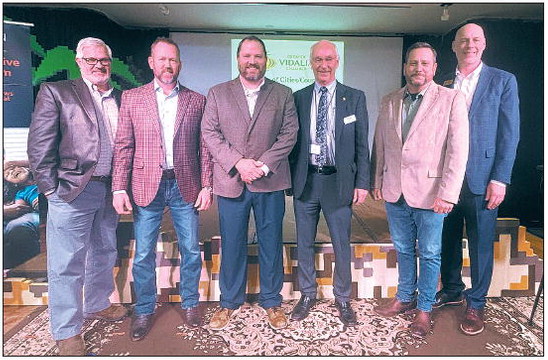Montgomery County BOE Opts Out of HB581
mrandolphadvance@gmail.com
The Montgomery County Board of Education authorized a resolution to opt out of the HB581 Floating Homestead Exemption on a 4-1 vote during a called meeting on Wednesday, February 12.
House Bill 581 is a bill that was signed into law on April 18, 2024, which created three major components regarding property taxes: a statewide floating homestead exemption, a new local option sales tax, and property tax procedural changes.
Though this bill was signed into law in April, it was contingent on the passage of an amendment to the State Constitution, which was voted on during the November 5 General Election. This amendment stated that the statewide floating homestead exemption would be created, but that local governments – city, county, and board of education – had the ability to opt out of the legislation if they felt the need. Some examples of reasons to opt out which were provided by the Association of Georgia County Commissioners included the existence of a local floating homestead exemption and complications that could arise because of the differences in what makes up the county’s property digest, as the exemption draws county funding from commercial and non-homestead properties.
This amendment was passed in the state, as 62.92% of voters agreed to allow the governments to opt out of the law. In Montgomery County, voters followed this approval, as 62.52% of voters authorized the ability for governments to decide whether or not to join the exemption.
In January, Board announced their intention to hold the public forums needed to move forward with opting out from the legislation. Citizens voiced their concerns to the Board on January 13 and 17, and met in the Board Room for one final public hearing on January 31.
Throughout the weeks since sharing their intent to opt out, Board members and Hightower have considered several various aspects and perspectives on the decision, including those of the public who spoke at the hearings or contacted the Board privately through phone calls and emails, school finance and law experts who provided trainings and one-on-one meetings to discuss the bill, local government officials, several legislators, and – most importantly, according to Hightower – the students, school staff, and all citizens of the county.
“The choice to consider opting out that HB581 made possible and that the vote provided for has been described as being between a rock and a hard place. We truly are having to choose between difficult options, and there is no decision that we can make here tonight that will not negatively impact someone’s finances,” Hightower told the meeting attendees.
Hightower shared that the Board had also considered the very high number of school districts choosing to opt out of the bill, as more than 80% of districts throughout the state had shared their intent to opt out of the legislation on February 2, including two local districts comparable to Montgomery County. “This includes Wheeler and Treutlen Counties, which are very comparable to our district. Both of those counties held their third public hearings on [February 10] and then voted immediately afterwards to opt out,” she shared.
Hightower said that the Board had also spoken with districts choosing not to opt out of the bill so that they may understand further reasoning in the decisions.
She stated that the Board was also taking into consideration its history of financial stewardship, as the district had been able to keep the millage rate lower than the rollback rate, have no facility debt, absorb 6 support positions, encourage family insurance plans to save on costs, and seek grants for purchases rather than local money. Hightower also stated that the Board was currently spending less per student than others comparable to Montgomery County, accounting for further savings.
“We do receive more state funds — $3,160 higher per full-time employee than the state average – because of our efforts here in this board office,” she elaborated, commending the Board Office’s financial staff.
Ultimately, Hightower told the attendees that the Board had three options in the decision.
The first option was to opt in to HB581 and raise the millage rate to mitigate the loss in income, which several citizens suggested during the public hearings. “Some household homestead property owners will save on taxes while most other homestead property owners will pay more because of the increased millage rate surpassing the savings of the homestead exemption. All other property owners – like business, commercial, agricultural, and rental property – will pay higher taxes as a result of the raised millage rate.”
Another option for the Board to consider was to stay in HB581 and not raise the millage rate, which would negatively affect the school system’s budget in 3 areas, including state equalization funds. “No voters knew this in voting, as it was changed afterward. With the school system’s budget being primarily people, it would most likely mean someone would not have jobs, thus, impacting the quality of education that we provide,” she explained.
The third option was to choose to opt out from the bill. “Some homestead property owners would not have future savings on homestead property taxes, and some will understandably feel that they knew the full impact of voting yes to HB581 and that their vote should be honored,” she remarked.
Hightower said that the Board considered each of these options, and looking into future options that may arise, such as the crafting of a homestead exemption uniquely tailored to Montgomery County and the passage of Senate Bill 44, which would allow schools to lower the millage rate as low as 10 mills without losing any equalization funds.
After sharing these considerations, Hightower made the recommendation that the Board approve a resolution to opt out of the bill. A motion was made by Board Member Susan Beard and then seconded by Board Member Pete Ward.
Prior to the vote, Board Member Allen Williamson shared several comments about his own personal confliction with the decision.
“Probably 60 years of politics in Montgomery County is coming to a head right now, and unfortunately, it’s causing conflicts between taxpayers and the local government. I hope the ways of doing business in the past are changing some,” he began. “There is no win with this. To me, it’s a no win situation. We are not going to do anything that is going to beneficial to the school in a sense; we are also not going to do anything that is beneficial to the taxpayer.”
He continued, “One way or another, at the end of the day, we have a mark to meet, whether it’s raising the millage rate or opting out of the homestead exemption. We have 920 kids to educate and it costs to do that. Unfortunately, the past 60 years is why we’re sitting here; we are in a hole that was created over 60 years doing business the way that Montgomery County has done that.”
Williamson said that when he first began campaigning for a position on the Board, he was told that decisions would be difficult and would always affect someone negatively; he stated he had seen this firsthand, as the decision troubled him over several weeks. “I came into this room tonight, truthfully, not knowing which way that I would vote simply because of the affect on either direction.”
He added, “This bill will ultimately negatively affect business in this county, and if we want business in this county, then we can’t negatively affect them. If we want people to reside in this county, we can’t negatively affect them.”
Williamson told the attendees that he felt that the Board of Commissioners and Board of Education needed to come together to find a way to help the taxpayers of the county, as he understood many citizens’ struggles. He shared that his father-in-law was in a position similar to several within the county, as he is an elderly man on a fixed income. “Either way that this goes is going to negatively affect my father-in-law tonight,” he commented, sharing that taxes would go up on either land or homes.
He shared his hope for growth in the county so that property taxes were no longer an issue, as he explained that he knows only of 2 businesses with more than 10 employees within the county that is not government funded.
Williamson concluded, “Decisions are hard and usually the ones that matter most are the most difficult.”
Four of the Board’s five members voted in favor of opting out of the decision, and Williamson opposed the resolution. Upon the vote, the Board then elected to go into executive session to discuss personnel before ultimately adjourning and making no further actions.





